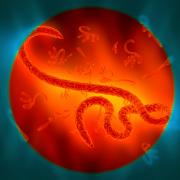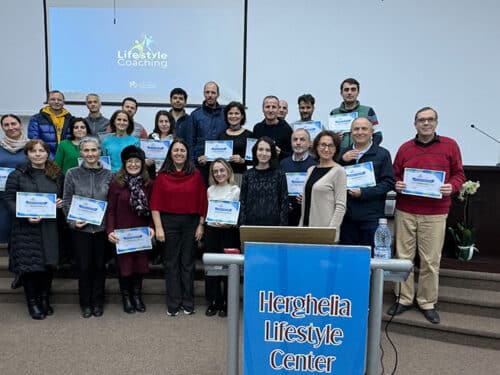By Peter Landless, MB, BCh, MMed, FCP (SA), FACC, FASNC, Director of Health Ministries for the General Conference of Seventh-day Adventists
The Ebola virus outbreak in West Africa has captivated the attention of the world. It has spawned genuine concern as well as a huge amount of fear and paranoia. At present it is confined to countries in West Africa.
Watch a report from the front lines of the Ebola war as two physicians, Gillian Seton, MD and James Appel, MD , share what it is like to serve at Cooper Adventist Hospital in Libera.
What is it and will it spread to the rest of the world?
This disease first appeared in 1976 in Sudan and the Democratic Republic of Congo, the latter in a village situated near the Ebola River, hence the name of the disease. It has been known in the past as Ebola hemorrhagic fever and is a severe and often fatal illness in humans. Outbreaks of this disease have been known to cause fatality in between 55 and 90% of those who are infected. In the current outbreak the death rate has been greater than 55% of those who get it.
Outbreaks of Ebola virus disease have occurred primarily in remote villages in Central and West Africa particularly near the tropical rainforests. It is a virus that spreads to humans by the handling of infected animals; the fruit bat is considered to be the natural host of the Ebola virus and is a delicacy in parts of the world where Ebola breakouts occur from time to time.
Ebola is introduced and spread through human populations following close contact with blood, secretions, or other body fluids of infected animals. It then spreads in the community through human-to human transmission resulting from direct contact with the blood, secretions including sweat and other bodily fluids of infected people. It can also spread by indirect contact with environments which have been contaminated by such fluids. The incubation period is between 2 and 21 days.
What are the symptoms?
Ebola viral disease (EVD) starts with acute symptoms including fever, intense weakness, muscle pain, headache and sore throat. Vomiting and diarrhea, rash and impaired liver and kidney function often follow. There is often associated internal and external bleeding.
Vaccine development is in the experimental phase as is specific antibody treatment. Immediate supportive therapy is required including rehydration and blood transfusions where needed. Strict isolation techniques are required to prevent spread to others.
Early treatment is ESSENTIAL!
If there is any possibility of having had contact and symptoms occur, report for help immediately.
The recent Ebola outbreak in West Africa has resulted in more than 5000 deaths this year.
The countries affected mainly are Liberia, Sierra Leone, and Guinea with some cases in Nigeria
The current outbreak is the world’s deadliest from this disease to date.
During this crisis, the Centers for Disease Control and the World Health Organization are carefully monitoring the situation, and travel warnings to and from the affected countries are in place.
Important precautions you should take.
Avoidance of travel from the three most affected countries to conferences elsewhere until there is clear evidence that the epidemic is abating and under control;
In the most severely affected areas, avoidance of attendance at any public gatherings;
Please be meticulous regarding personal hygiene and food handling; wash hands regularly and well. Use hand sanitizer liberally;
When meeting and greeting, please avoid even hugging and other cherished public displays of affection during this difficult time.
These recommendations are stringent, but necessary, and reminiscent of those suggested during the SARS outbreak a few years ago.
Will it spread like the flu?
Fortunately not – air droplets do not spread it, rather direct contact as described above. As members of God’s great Church family, each of us has a responsibility to do our part in the prevention of possible spread of the Ebola epidemic.
What is the Seventh-day Adventist Church doing to help?
The General Conference is working in close partnership with ADRA, Adventist Health International and Loma Linda University in supporting the safety of personnel and patients at the Church’s hospitals in Liberia and Sierra Leone. In Liberia, the Cooper Adventist Hospital, staffed by brave and dedicated personnel, has been designated as a non-Ebola hospital, as a signal of support to the over-burdened health system in that territory. The Liberian government has mandated that patients suspected to be infected with the Ebola virus should be directly sent to the government hospitals specifically designated to treat this devastating disease.
Three things you can do to help.
Keep the countries hardest hit in your prayers along with those infected and their families.
Pray for all those who are helping to care for those infected.
You can add to your prayers financial support for the efforts of ADRA and Adventist Health International in this work. You may give online here.
Additional Resources on Ebola:
WHO Ebola information.
Up-to-date U.S.CDC information on Ebola.
Facts about Ebola in the U.S. (missing)
North American Division Ebola disease handout.
Resources for Healthcare Professionals:
Evaluating returned travelers (missing)
Ebola preparedness resources for hospitals.
Information for healthcare workers (CDC).
Guidance on PPE to be used (includes donning and doffing PPE) (CDC).
Ebola virus disease information for clinicians (CDC).



